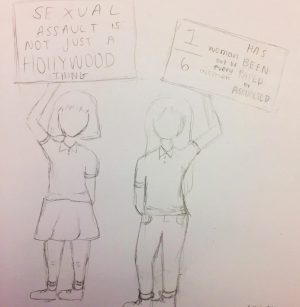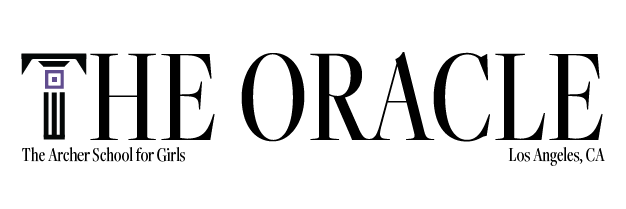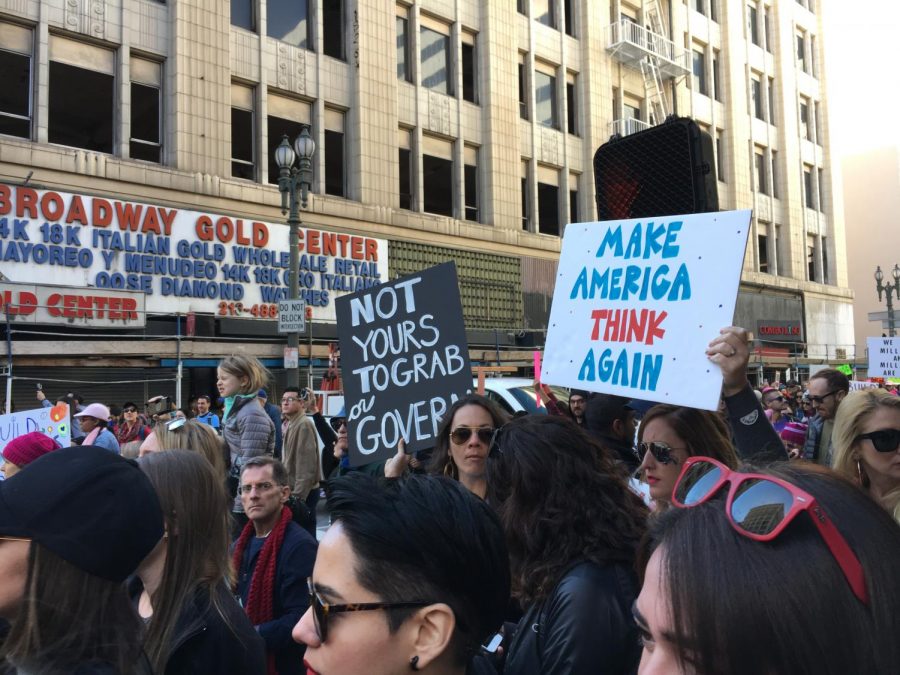‘I was mortified’: Archer students share sexual assault experiences, hope to continue dialogue
May 28, 2018
Photo credit: Anna Brodsky
Women of all ages march for their rights in Los Angeles during the 2017 Women’s March. The goal of the march was to protest the lack of women’s rights, including the over-sexualization of women.
A survey administered in 2011 by the American Association of University Women revealed that in any given school year, 58 percent of seventh through 12th graders will experience sexual harassment.
Since The New York Times published a series of sexual harassment and assault allegations against Harvey Weinstein in October 2017, the rate of women speaking up about their experiences with sexual assault has increased. Although sexual assault has been a large discussion within Hollywood and the “adult” world, through movements such as Time’s Up, it has not been as large of a discussion within the under 18 age group.
Merriam Webster defines sexual assault as “illegal sexual contact that usually involves force upon a person without consent or is inflicted upon a person who is incapable of giving consent, as because of age or physical or mental incapacity, or who places the assailant, such as a doctor, in a position of trust or authority.”
In a survey sent out to Upper Schoolers that asked students to define sexual assault in their own words, not every definition was identical, but all responses noted that sexual assault is unwanted. According to students, being sexually assaulted or harassed is a “very traumatizing” event that can be “difficult” to openly discuss.
However, two Archer students opened up about their experiences with sexual assault in an effort to show others that they are not alone and to help create a safer community.
“I haven’t openly told many people until recently, but when I was 13 I went to my first big party,” Sophie Pollack ‘20 said. “There were illegal substances, and I ended up getting roofied [and raped]. That was actually how I lost my virginity. I was only 13.”
According to Pollack, it was not easy to open up about her experience due to her fear of judgement. Two years after she was assaulted, Pollack told her parents and has since gotten professional help.
However, sexual assault and harassment do not only take place outside of school. Kisa Rozenbaoum ‘18 said she was affected by sexual harassment at her former school during a fitness class.
“I came to Archer because I was sexually assaulted in middle school,” Rozenbaoum said. “I was in eighth grade. It happened during P.E. class at my school. It was in the pool, and this boy tried to grab me by the butt. So I turned him around and asked him what he was doing.”
Although Rozenbaoum immediately confronted the boy that was attempting to take advantage of her, the effects of his action did not stop there.
“The school did something about it; they put it on his record. But then I was very stressed out about what was going to happen in high school, so my mom suggested an all-girls school,” Rozenbaoum said. “Archer became kind of like my safe place.”
But before the boy was reprimanded for his actions, school administrators initially did not believe Rozenbaoum.
“[The school] kept asking me these questions like, ‘Are you sure he didn’t do it by accident?’” Rozenbaoum said. “I was mortified. How could he have done that on accident? He grabbed me.”
With the recent nationwide increase in awareness regarding sexual assault cases on college campuses, many students have united to fight to make their universities safer communities. But in high school, where assault victims are often met with rumors, gossip and social media posts instead of support, victims said it was not as easy to speak up.
“I didn’t say anything for two and a half years because I didn’t think that anyone would believe me, which is the hardest part,” Pollack said. “People will either believe what they see or they’re very against it because they think its fake or a cry for attention — like the boy who cried wolf.”
School counselor Patty Lancaster said that it is understandable that sharing very personal information with a large group of people can be scary and difficult.
“I find that there is a lot of fear around saying something,” Lancaster said. “If somebody was assaulted, they might be confused, like ‘What would happen if I come forward?’ and they can be loaded down with tons of shame if they do.”
Some students, like Rozenbaoum, do find Archer to be a “safe place,” but others would like to see the community work even harder to create a more accepting and comforting environment. According to Lancaster, the best way to do this is by starting with open dialogue available to everyone in the community.
“I think a dialogue with the students, like a meeting at lunch where people shared what’s already out there, as far as resources and other people’s experiences, [would be beneficial].” Lancaster said. “Talking about what other people have gone through and experienced can feel safer than talking about our own personal stories at first.”

The Time’s Up and #MeToo movements have catalyzed the conversation about the prevalence of sexual assault in entertainment and the workplace and have held assailants accountable for their actions. But there are also less publicized movements such as #MeTooK12, which was created to highlight the fact that sexual assault and harassment does take place in educational environments, even before college. The movement also hopes to encourage students who have been sexually assaulted or harassed to speak out and have their voices heard.
Pollack and Rozenbaoum both agree that being a support system for victims and bringing more attention to the presence of sexual assault within school communities is an important step in continuing the conversation.
“Those that help support people and give them someone to talk to and guide them can really help to get through it,” Rozenbaoum said.
“I think being more open and listening to other people, especially without judgment, [is important] because people don’t speak up about stuff because people will judge,” Pollack said. “I think the Archer community can have more discussions about it or maybe a Community Connections or class meeting or something where people can get up and share their stories and talk about experiences in a shared group.”


Sean Conley • Aug 28, 2018 at 8:51 am
Hey, cool story.
Sophie Pollack • May 30, 2018 at 12:31 am
I am so honored that I was able to finally speak my mind to the community and open up about this. Thank you Nicki for writing this amazing article and allowing me to share my story <3
Kristin Taylor • May 30, 2018 at 4:34 pm
Sophie, I rarely comment due to my role as Oracle adviser, but I wanted you to know how deeply sorry I am that you experienced this and how brave I think you are for being willing to go on the record. You and Kisa both let others know they are not alone.
Noa Wallock • May 29, 2018 at 9:51 pm
Nicki, this is a wonderful piece. Also, these girls are so brave to share their stories.